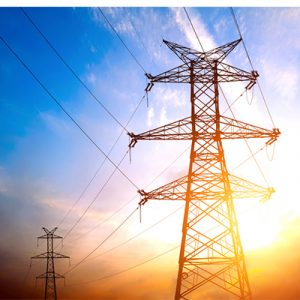 Interested in energy technology? Check upcoming energy technology and related topic symposia taking place at the 245th ECS Meeting in San Francisco, CA, from May 26-30, 2024. Submit your abstract and join us!
Interested in energy technology? Check upcoming energy technology and related topic symposia taking place at the 245th ECS Meeting in San Francisco, CA, from May 26-30, 2024. Submit your abstract and join us!
Abstract deadline: December 1, 2023
 Interested in energy technology? Check upcoming energy technology and related topic symposia taking place at the 245th ECS Meeting in San Francisco, CA, from May 26-30, 2024. Submit your abstract and join us!
Interested in energy technology? Check upcoming energy technology and related topic symposia taking place at the 245th ECS Meeting in San Francisco, CA, from May 26-30, 2024. Submit your abstract and join us!
Abstract deadline: December 1, 2023
 Interested in the energy technology field? Check out upcoming symposia and related topics taking place at the 244th ECS Meeting from October 8-12, 2023, in Gothenburg, Sweden. Submit your abstract and join us!
Interested in the energy technology field? Check out upcoming symposia and related topics taking place at the 244th ECS Meeting from October 8-12, 2023, in Gothenburg, Sweden. Submit your abstract and join us!
Extended abstract deadline: April 21, 2023
 The ECS Energy Technology Division recognized the 2022 Energy Technology Division Graduate Student Award Sponsored by BioLogic recipients at the 241st ECS Meeting in Vancouver, BC, Canada. Grace Lindquist of the University of Oregon was acknowledged for outstanding research in the development of robust high-performance alkaline membrane electrolyzer technology; and Zachary Schiffer of the Massachusetts Institute of Technology for developing methods for harnessing renewable ammonia and for understanding energy exchanges in electrochemical transformations.
The ECS Energy Technology Division recognized the 2022 Energy Technology Division Graduate Student Award Sponsored by BioLogic recipients at the 241st ECS Meeting in Vancouver, BC, Canada. Grace Lindquist of the University of Oregon was acknowledged for outstanding research in the development of robust high-performance alkaline membrane electrolyzer technology; and Zachary Schiffer of the Massachusetts Institute of Technology for developing methods for harnessing renewable ammonia and for understanding energy exchanges in electrochemical transformations.
 On June 24, 2020, Dr. Paul Kenis, 2020 winner of the Energy Technology Division Research Award, presented his talk on “Electrochemical CO2 Reduction: Path Towards a Carbon Neutral Chemical Industry?” via a live webinar presentation.
On June 24, 2020, Dr. Paul Kenis, 2020 winner of the Energy Technology Division Research Award, presented his talk on “Electrochemical CO2 Reduction: Path Towards a Carbon Neutral Chemical Industry?” via a live webinar presentation.
Dr. Kenis’s talk covered a summary of the status of CO2 electrocatalysis, the techno-economic and life-cycle analysis of CO2 electrolysis to identify remaining hurdles, and the prospects of CO2 electrolysis technology contributing to a future sustainable chemical industry.
View Dr. Kenis’s webinar presentation, here.
Following the talk, attendees were given the opportunity to ask Dr. Kenis questions in a Q&A session, available below. (more…)

The Energy Technology Division Research Award was established in 1992 to encourage excellence in energy related research and to encourage publication in the Journal of The Electrochemical Society. The award recognizes outstanding and original contributions to the science and technology of energy related research areas that include scientific and technological aspects of fossil fuels and alternative energy sources, energy management, and environmental consequences of energy utilization.
Christina Bock, president of the Board of The Electrochemical Society (ECS), congratulated John B. Goodenough, M. Stanley Whittingham, and Akira Yoshino who today were jointly awarded the 2019 Nobel Prize in Chemistry.
“On behalf of the entire ECS community, I would like to extend my sincerest congratulations to our esteemed members: John Goodenough, M. Stanley Whittingham, and Akira Yoshino on being awarded the 2019 Nobel Prize in Chemistry ‘for the development of Lithium-ion batteries,’” said Bock. “This is fitting recognition for the truly groundbreaking advancements these pioneers have made for our field and for the whole of humanity. Simply put, their research is the enabling science upon which the solutions to the grand challenges facing the planet—renewable energy, clean transportation, communications to name but a few—will be based. We are honored to count their almost 60 years of combined membership among our ranks.” (more…)
 To compete globally in key energy sectors through the 21st century and beyond, the U.S. must accelerate the discovery and development of novel materials. The I05 symposium at the 236th ECS Meeting, “Accelerated Discovery and Development of Energy Materials,” is a unique opportunity for researchers and stakeholders from electrochemistry and materials research to meet, network, and initiate new collaborations in highly impactful research and development. The electrochemical research community focuses on important energy applications such as generation, storage, distribution, and utilization. The materials research community focuses on computational and experimental methodologies for accelerated materials discovery and development, and advancing multiple sectors. While rapid scientific advances are occurring independently in both fields, bringing world leaders from the two fields together is an extraordinary opportunity to achieve materials breakthroughs with the potential to revolutionize the U.S. energy sectors. (more…)
To compete globally in key energy sectors through the 21st century and beyond, the U.S. must accelerate the discovery and development of novel materials. The I05 symposium at the 236th ECS Meeting, “Accelerated Discovery and Development of Energy Materials,” is a unique opportunity for researchers and stakeholders from electrochemistry and materials research to meet, network, and initiate new collaborations in highly impactful research and development. The electrochemical research community focuses on important energy applications such as generation, storage, distribution, and utilization. The materials research community focuses on computational and experimental methodologies for accelerated materials discovery and development, and advancing multiple sectors. While rapid scientific advances are occurring independently in both fields, bringing world leaders from the two fields together is an extraordinary opportunity to achieve materials breakthroughs with the potential to revolutionize the U.S. energy sectors. (more…)
Hydrogen gas: it’s storable, can refuel a car in minutes (versus batteries which can take hours to recharge), and its waste product is water. It is the holy grail of clean-energy advocates.
The only problem is that the electrolyzers that make hydrogen from renewable energy are quite expensive. But, that soon may change, according to Ars Technica.
According to a new paper in Nature Energy, researchers from universities in Germany and at Stanford University have created a financial model for a wind farm connected to a hydrogen electrolyzer. (more…)
Perovskite-based solar cells are all around great. They offer energy efficiencies similar to those of traditional silicon-based cells, are lightweight, simple and cheap to produce, and offer physical flexibility that could unlock a wide new range of installation methods and places, according to Georgia Teach Research Horizons.
The only problem: figuring out how to produce perovskite-based energy devices that last longer than a couple of months.
Researchers at Georgia Institute of Technology, University of California San Diego, and Massachusetts Institute of Technology may be closer to solving that problem. (more…)
According to Forbes, engineers at the University of Colorado Boulder have created a new material that works like an air conditioning system for structures—cooling rooftops with zero energy consumption.
The material, about the same thickness as aluminum foil, is rolled across the surface of a rooftop, reflecting incoming solar energy back into space while simultaneously purging its own heat. Adding to its appeal, the material is adaptable and cost-effective for use in large-scale residential and commercial applications, as it can be manufactured on rolls. (more…)